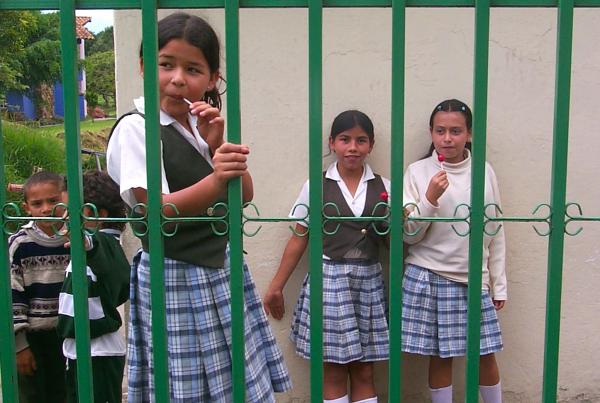As a “late to the game” university student, I wasn't able to study abroad as part of my undergraduate degree. So when I signed up to do a "learn to teach English as a foreign language" (TEFL) course in Guatemala, I was slightly nervous. I was worried about my ability to focus on my studies and resist the temptation spend all my time exploring the beautiful city of La Antigua and its surrounding area.
However, after two week of backpacking from Cancun to Antigua, the novelty of hostel-hopping had worn off. The idea of unpacking my belongings and leaving them in one place for a whole month seemed like a complete luxury.
In the end, my four weeks of intense TEFL training passed quickly in the charming colonial city. And, as it turned out, the course was enhanced by my location.
Here are three reasons why I would encourage anyone who is thinking of taking a TEFL certification course to do it abroad:
1. You'll meet students who want to learn.
Guatemala, I have found, is a country that people know little about and associate with fear. The same can be said about many Latin American countries, but what makes Guatemala unique is that 2016 marks the 20th anniversary of the end of the 36-year-long Guatemalan Civil War.
When the war ended in 1996, I was seven years old, living life as a carefree Canadian child, in a country so free I wouldn't understand it until I was much older. Guatemalan children my same age had experienced terror and deaths of family members. Some were even forced to care for younger siblings, as their parents and older siblings were occupied with other tasks. Maybe it is for this reason that they radiate an appreciation for life.
Every week, I had the opportunity to practice my newly acquired teaching skills on students at my school. My nerves related to standing in front of a class were worn down gradually by the warm demeanour of my Guatemalan students. They were eager to learn, always smiling and king, and their enthusiasm made me want to sit with each one individually until they could speak English.
Learning another language is tough on the ego. As someone learning to become a teacher, there is no better way to understand how your students are feeling than to experience it on a daily basis.
The classes at this institute were mainly structured around the schedules of adults who work during the day and either come in to take English classes before or after work. During my final week of the course, I taught every day at 7 a.m. for an hour. Some students would get up take the bus at 6 a.m. to come in for an hour class, before working a full day. I found the amount of effort they put into learning English motivating and inspiring.
2. You'll find a sense of community.
Antigua swarms with every type of traveller there is. Backpackers, volunteers, expats, retirees—you name it, they're wandering the narrow one-way streets, Lonely Planet in-hand. I lived with a family while studying in Antigua and I never once felt like I was intruding. They were kind and giving and happy to have me in their home. I watched three other guests come and go during my time there; each one was treated with the same kindness.
I received the same friendliness in the streets when I sought assistance—one of a million lost and ignorant gringos. Many backpackers are merely following the gringo trail—either south or north—and there is a plethora of hostels to house them, as well as activities to entertain them.
Other travellers have found a way to make Antigua their home and contribute to the community. There are countless NGOs, schools and volunteer programs based in and around Antigua. The more time I spent in the city, the more I learned about the various ways to give back to the community. While my goal was to always to get a job teaching English, my perspective was broadened as I saw all the other work possibilities.
When I continued to go to the same coffee shop and they remembered my order, I felt that familiar pang of comfort and my heart strings tugged. I heard a pleading voice in my head that that said “we can’t leave this place.” While at times I find myself frustrated with fellow travellers, their lack of consideration and their ignorance when it comes to learning the language, in Antigua I also saw another side. There are a lot of travellers who have made their time in another country more purposeful. It made me feel like this is a place where “accepted gringa” is not an oxymoron.
3. You'll learn that the key to being a good teacher is to be a good student.
As I alternated roles from student to teacher and back to student, I gained an interesting perspective on the cycle of language in a country. In a strictly English-only classroom, student are timid and nervous to speak; they leave the classroom laughing and chatting energetically in Spanish. Personally, outside the classroom I speak only Spanish to locals—even when they see me and respond in English. Sometimes I get by without a hitch, other times I forget the most obvious words and walk away dumbfounded, having confused myself and the poor recipient of my Spanglish.
During the TEFL course, my position in the language cycle was constantly changing. As I studied and worked towards gaining my TEFL certificate I was a student; when I taught in the classroom I was a teacher; as a speaker of a Spanish I am forever a student.
I suppose that's the beauty of travelling and putting ourselves into new situations; we are all going to be students at some point. Learning another language is tough on the ego. There is a constant fear of being perceived as ignorant or uneducated. But when you’re living in another country, there is no time to worry about pride. As someone learning to become a teacher there is no better way to understand how your students are feeling than to experience it on a daily basis. Nothing can make you appreciate your students as learners of a second language more than the constant reminder that you are one yourself.
Having finished the TEFL course, I am now at a crossroads. Do I leave this beautiful place I’ve grown attached to, or move on to the unknown? It’s a pretty spectacular decision to have to make.
Add this article to your reading list




